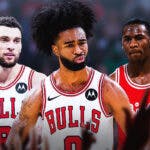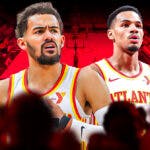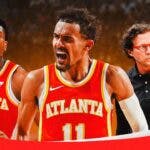It’s 6:08 pm on July 14th, 2018. I’m pounding away on my laptop, three chrome browser windows with different segments of the NBA’s Collective Bargaining agreement open next to the word document I’m currently typing. I’ve spent three dollars for the luxury of calling this stylish, modern coffee shop my office for the day. Looking out the massive bay windows from which I sit across, I sigh a breath of relief.
During the past week alone I’ve written five pieces on Carmelo Anthony (three of which I felt fit for publishing) and I’m running out of patience. I’ve examined salary cap implications, basketball fit, projected best fits, and so much more.
I’m exhausted, but as I take the last swig of my now watered down cold brew coffee, leaving behind only remnants of brown liquid that a passer-by could easily construe as whisky, I hit submit on the final piece and think to myself “thank goodness I can stop thinking about Carmelo Anthony for a few weeks.”

Flash forward five days later. I awake in a cold sweat. My body is frozen. A poltergeist taking the shape of ESPN’s Adrian Wojnarowski hovers above me. Grasping my cell phone with an almost unknowable spectral energy, the poltergeist suspends the phone above my trembling face. I stare at my lock screen, a picture of a small farmhouse on the prairies of New Mexico. A location long forgotten to me, the memory whisked away like ash in the wind. Suddenly a flash, the sound of an iPhone Twitter alert rings with deafening ferocity. My eyes are frozen, unable to break from the screen’s allure. The poltergeist bellows with laughter as the screen reads:
“Oklahoma City has agreed to trade Carmelo Anthony and a protected 2022 first-round pick to Atlanta for point guard Dennis Schroder and Mike Muscala, league sources tell ESPN. Anthony will be waived, and he will join team of his choice. Rockets are frontrunner.”
I can never escape.

Winners:
OKC:
No spoilers as to if the other two teams in the trade are winners and losers, but Oklahoma City did best in this trade that was good for everyone involved. Not only did they find a willing trade partner to take back the Carmelo Anthony contract, but they acquired a high-end contributor and a high upside young prospect at the same time. Finally and most importantly they saved significant money on their tax bill for the 2018-2019 season before finally ducking under the tax in 2019-2020.
After attempting to spell Dennis Schröder’s last name almost five times, I finally caved and googled it. This should have no bearing on the level of play he can bring to the Thunder’s second unit. Following the model the Los Angeles Clippers set out with Lou Williams, Schröder looks to fit into the Oklahoma City second unit as a super substitute, someone that can play at an above average starter level though is hindered by something significant.

For Schröder it’s his shooting touch. Schröder shot 29% on three-point attempts last season. That said, Schröder’s speed and ability to get to the rim matches that of any starting guard in the league. Put up against opposing teams reserve units, Schröder should fly by, providing a massive spark off the bench.
Many questions exist regarding Schröder’s attitude problems, my colleagues included, but there should be some hope of solving these issues in Oklahoma City. Schröder’s criticisms have always stemmed from the belief that he’s the best player on the Atlanta teams he played for. In Oklahoma City, there is a clear hierarchy, with Schröder representing at best the third best player on the team.
For those claiming this is another Reggie Jackson situation, it just might be. But don’t forget how good that Thunder team was when Reggie added a spark off the bench.

In addition to dumping a very negative value in Carmelo Anthony for a slightly negative value player in Dennis Schröder, Oklahoma City acquired a player those of us subscribed to the Duncan Leroux school of NBA player evaluation rate quite highly in Timothé Luwawu-Cabarrot (henceforth for my own sanity, TLC). With a high projected defensive ceiling and good physical tools, TLC’s only major weakness seems to be effort level put into the game. Showing promise as a three-and-D wing (TLC shot 36% from behind the arc during his final season in Europe), the inexpensive wing defender should make an excellent addition to the Thunder’s bench.
Finally, the Thunder should be lauded for their protection on the first round pick they sent out. Just look at the protections Memphis added to their first-round pick in the Jeff Green and how that has come back to haunt them. If the pick isn’t a lower end first rounder in 2022, it simply turns into two future second-round picks.
Effectively the Hawks only get a first round pick if Oklahoma City is still good. The ultimate goal of every NBA team is to be good. This is a good thing.

The Professional Basketball Club LLC:
What is this comically named Club/LLC you might ask. Why it’s the comically named Oklahoma City Thunder ownership group with a net worth sitting around $600 million dollars. They made out like bandits, saving a reported $61 million dollars in luxury tax payments.
Looking at my notes for other reasons that the Professional Basketball Club LLC won this trade. Here is what I have:
-Saved a boatload of money
-Saved a boatload of money
-Don’t forget to mention how much money they saved.

So after evaluating those notes, I think it’s fair to say, they saved a bunch of money.
Atlanta:
Winning team number two in this trade, Atlanta found themselves unloading what their front office considered a toxic contract and got multiple small assets in return. Effectively they paid 28 million dollars up front to dump an asset and gain a first-round pick in the future.
Mike Muscala is an effective role-player. Muscala could contribute to a good team but Atlanta is not that right now. If Atlanta can get a potential rotation player in line with their own timeline in exchange for Muscala than all the better. Getting Justin Anderson who’s under contract for the next two years is an excellent addition. On top of that, Anderson’s positional overlap with Kent Bazemore allows for Atlanta to justify trading Bazemore to a willing contender.

I lauded Oklahoma City for the protections on their own pick, but that doesn’t mean it’s not a win for Atlanta. The 2022 draft might just end up being the first draft without one-and-done, meaning even a pick that lands in the 20’s will have significant value. The worst case scenario, if the pick doesn’t end up converting, is that Atlanta ends up with two future second round picks, which if Oklahoma City is bad would still have some relative value in creating bench players. Overall, Atlanta should revel in the fact that their ownership was willing to pay the extra money this year for a brighter future.
Philly:
Oh heck, Oh shoot, is this the third team in a three-team trade being named a winner?! Indeed Philadelphia, which seemed to inject itself into this trade at the last moment, comes out of this exchange a winner. Adding, as previously mentioned, Mike Muscala makes for solid a bench contributor for a high-end team. Philly needed a big man shooter after Nemanja Bjelica decided that Sacramento was a European city and Muscala fits that role quite well. Giving up TLC and Justin Anderson wasn’t super ideal, but clearing out roster space before the league-wide cut-down date isn’t the end of the world.

Carmelo Anthony:
There is no bigger winner in this entire ordeal than Carmelo Anthony. The Atlanta Hawks are willing to pay all $28 million dollars left on Anthony’s contract in a buyout. Carmelo Anthony apparently now has his choice of playing for Houston, Miami or Los Angeles. Carmelo Anthony’s personal life absolutely stays winning.
Losers:
The Sacramento Kings
Oh Sacramento Kings, even when you have nothing to do with a trade you still seem to find yourself on the losing end of the exchange. In this specific case, Sacramento finds themselves here because they’re the last team with cap space left.

After Brooklyn took on Kenneth Faried and Darrell Arthur for a first and a second-round pick, Chicago took a flyer on Jabari Parker, and Atlanta committed to this deal, what exactly is left on the open market for the Kings to use their space on? Do they commit to their life mission of an all bigs and shooting guards roster by signing Clint Capela or Rodney Hood to an offer sheet? Do they… do something else? The door’s closed on any moves Sacramento could realistically make this offseason, and that’s unfortunate (and also incredibly Kings).
Me:
My favorite part of writing comes from when I can be condescending and make fun of a decision. There’s just a small sense of joy I get from making snarky remarks from the sidelines, that sort of “I could have done it better” mentality. I know, I know, I must be a blast at parties. But when I was making my initial list of who won and who lost this trade, I struggled to even find a single loser of this trade at first. So I guess I lose, there isn’t really anything to criticize here.




